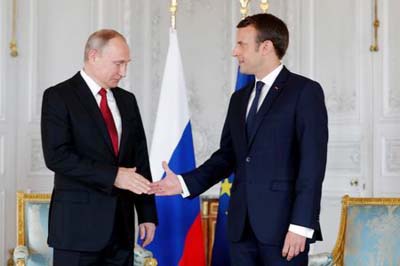
Reuters, Paris :
President Emmanuel Macron is starting to realign France’s foreign policy, setting out plans to be less interventionist in conflicts abroad and putting his country’s national security at the heart of diplomacy.
When Macron, 39, took office just over a month ago, he was widely expected to put the emphasis on continuity in foreign policy, an area in which he is a newcomer.
Following a policy based largely on ideological interests, France has in recent years been quick to intervene militarily in conflicts such as those in Libya, Mali and Central African Republic. That appears to be about to change under Macron.
This week he dropped demands for President Bashar al-Assad to depart as a condition for any peace settlement in Syria and held out an olive branch to Russian President Vladimir Putin at talks in Versailles on May 29.
Macron appears to be broadly aligning his foreign policy with the U.S. priorities of tackling terrorism while seeking better ties with Russia, which he considers a long-term partner rather than a direct threat to Europe.
Diplomats and officials say he is also seeking to shift policy by making clear his immediate aims are to weaken Islamist militants who threaten France from the Middle East and embark only on diplomatic initiatives that can bring concrete results.
“With me it will be the end of this sort of neo-conservatism that has been imported to France over the last 10 years,” Macron told eight European newspapers this week. “We need to rediscover the coherence and strength of an international policy that restores credit and to have an unrelenting security policy … to fight terrorism.”
French interventions in Middle East conflicts and its rigorous secularism have exposed it to attack by Islamist militants. Gunmen and suicide bombers killed 130 people in and around Paris in November 2015 and over 100 were killed in other Islamist attacks in France in the past two-and-a-half years.
Some veteran French diplomats and officials say the policies of Macron’s predecessors, Francois Hollande and Nicolas Sarkozy, kept the country on the front line while others, such as the United States and Britain, pulled back from foreign adventures.
France also joined sanctions against Russia after it seized the Crimea peninsula from Ukraine in 2014.
Under Macron, France’s focus appears likely to shift to areas where Washington sees little added value, such as Africa, or to climate change, on which Washington and Paris disagree.
“You can bet that the Middle East peace initiative we promoted for the last few years is dead and buried,” said a French diplomat of international efforts to improve ties between Israel and the Palestinians.
President Emmanuel Macron is starting to realign France’s foreign policy, setting out plans to be less interventionist in conflicts abroad and putting his country’s national security at the heart of diplomacy.
When Macron, 39, took office just over a month ago, he was widely expected to put the emphasis on continuity in foreign policy, an area in which he is a newcomer.
Following a policy based largely on ideological interests, France has in recent years been quick to intervene militarily in conflicts such as those in Libya, Mali and Central African Republic. That appears to be about to change under Macron.
This week he dropped demands for President Bashar al-Assad to depart as a condition for any peace settlement in Syria and held out an olive branch to Russian President Vladimir Putin at talks in Versailles on May 29.
Macron appears to be broadly aligning his foreign policy with the U.S. priorities of tackling terrorism while seeking better ties with Russia, which he considers a long-term partner rather than a direct threat to Europe.
Diplomats and officials say he is also seeking to shift policy by making clear his immediate aims are to weaken Islamist militants who threaten France from the Middle East and embark only on diplomatic initiatives that can bring concrete results.
“With me it will be the end of this sort of neo-conservatism that has been imported to France over the last 10 years,” Macron told eight European newspapers this week. “We need to rediscover the coherence and strength of an international policy that restores credit and to have an unrelenting security policy … to fight terrorism.”
French interventions in Middle East conflicts and its rigorous secularism have exposed it to attack by Islamist militants. Gunmen and suicide bombers killed 130 people in and around Paris in November 2015 and over 100 were killed in other Islamist attacks in France in the past two-and-a-half years.
Some veteran French diplomats and officials say the policies of Macron’s predecessors, Francois Hollande and Nicolas Sarkozy, kept the country on the front line while others, such as the United States and Britain, pulled back from foreign adventures.
France also joined sanctions against Russia after it seized the Crimea peninsula from Ukraine in 2014.
Under Macron, France’s focus appears likely to shift to areas where Washington sees little added value, such as Africa, or to climate change, on which Washington and Paris disagree.
“You can bet that the Middle East peace initiative we promoted for the last few years is dead and buried,” said a French diplomat of international efforts to improve ties between Israel and the Palestinians.

